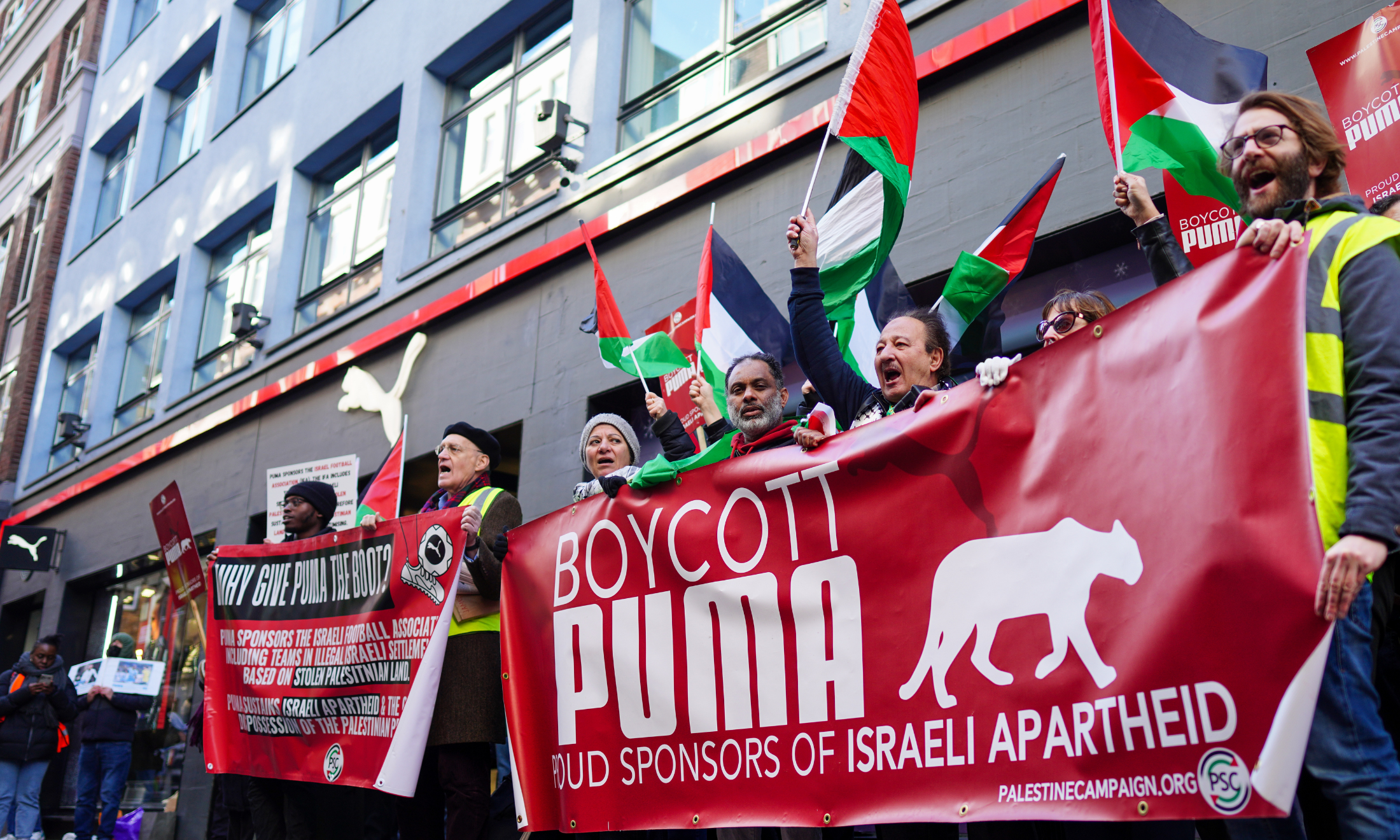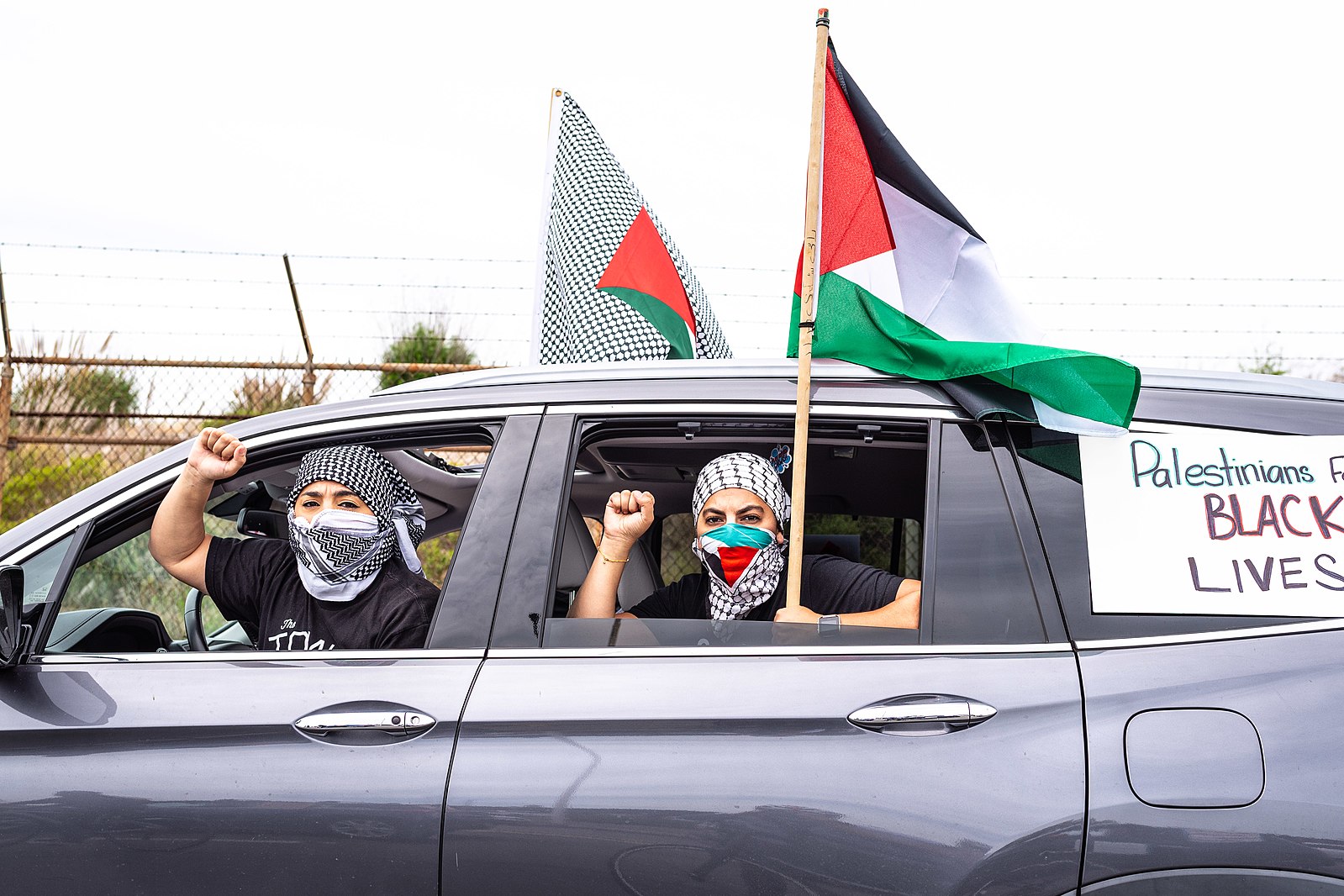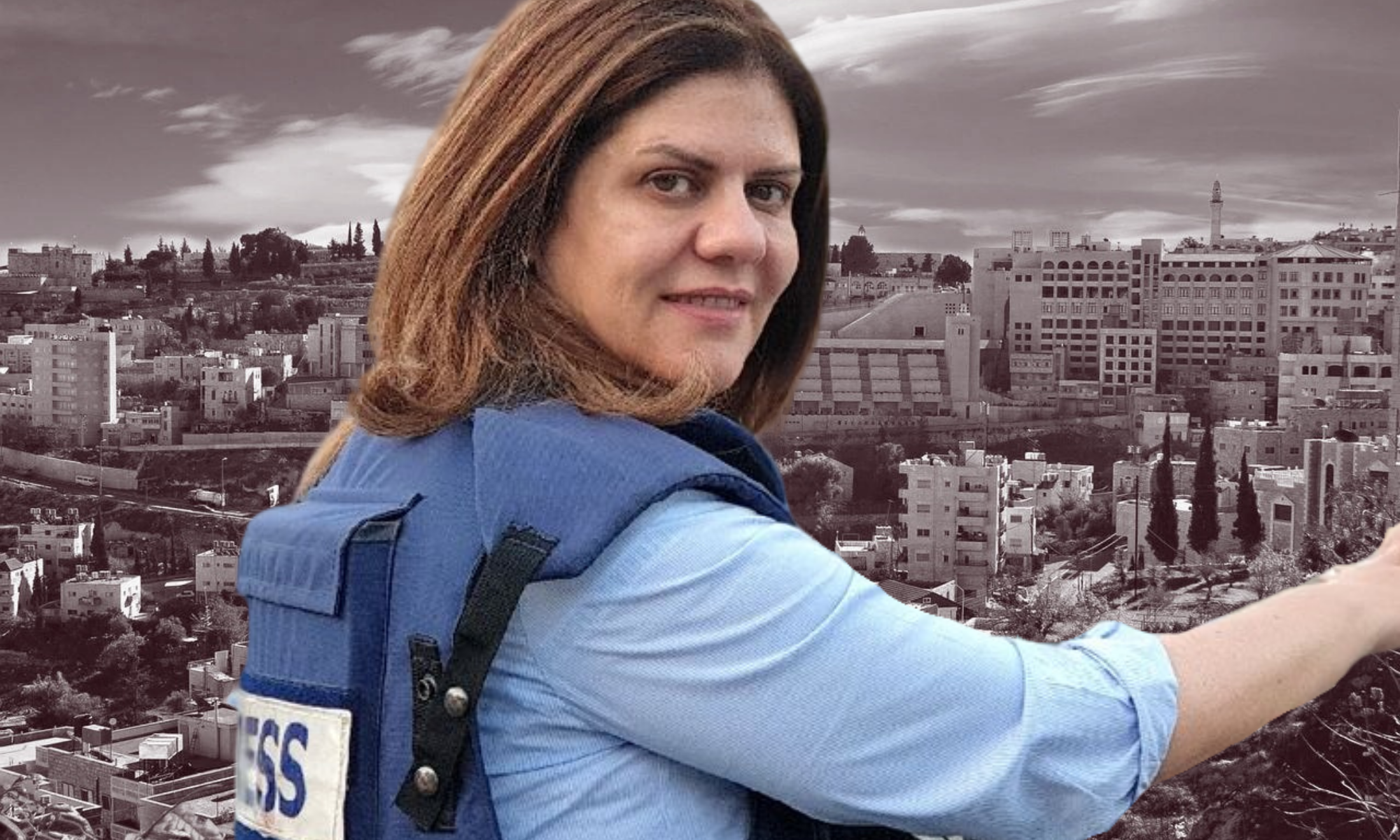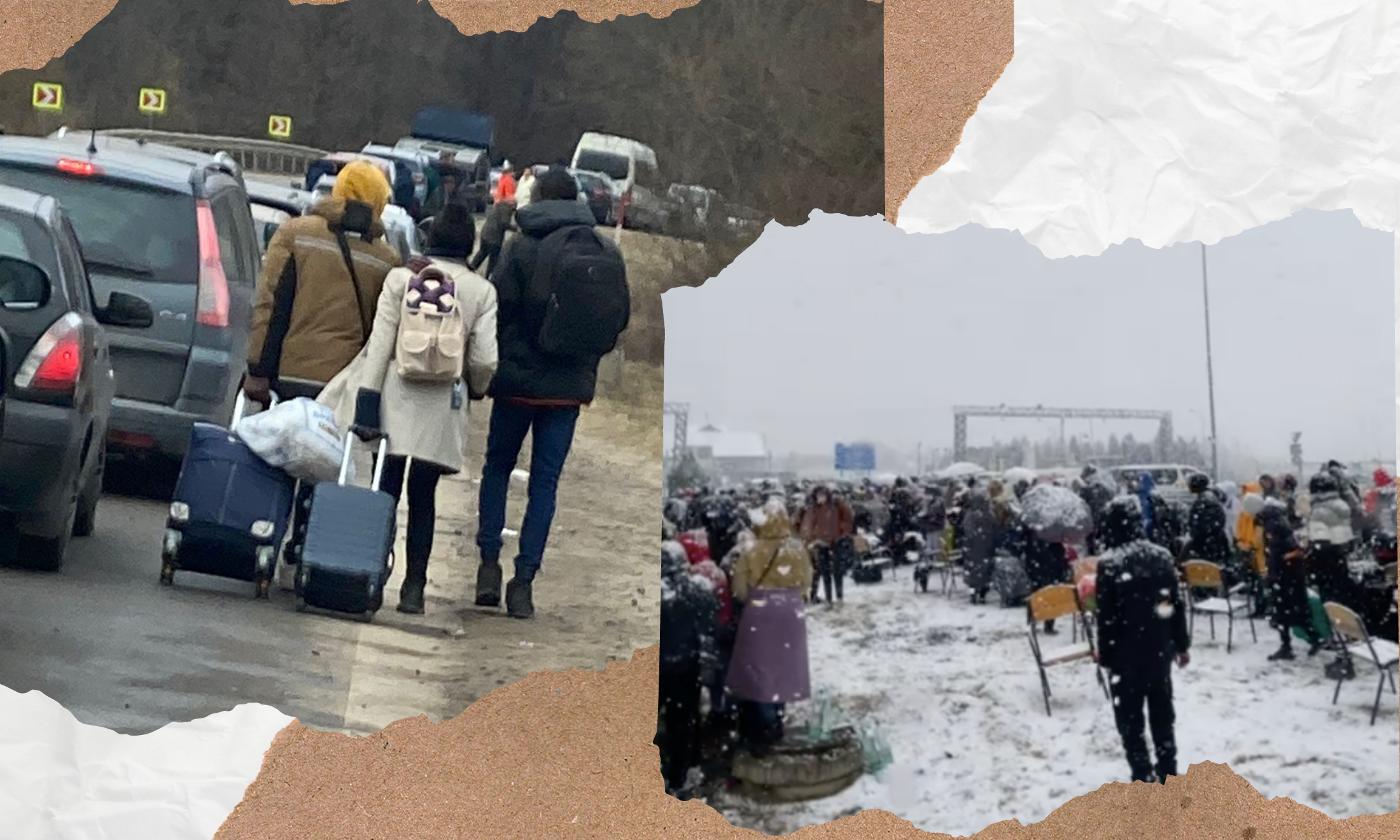
Alisdare Hickson
Turns out the West understands boycotts, sanctions and divestment when it comes to Russia
For supporters of Palestinian liberation, the response to war in Ukraine has been a visceral lesson in double standards.
Mouna Kalla-Sacranie
03 Mar 2022
As the devastating situation in Ukraine has unfolded over the last week, horrifying images and videos of the crisis have been circulating online. However, amidst the scenes of panic and destruction on the ground, certain images and pieces of footage have been going viral on social media that require a second look.
One photo shows an inferno-like explosion, obliterating what appears to be a civilian building. A TikTok video posted with the tags ‘#ukraine #army’ sees a blonde child, utterly fearless, confronting a heavily armed soldier. These images, among others, have been viewed and shared by millions in the last week. The footage of the young girl in particular, uploaded by @staystrongukrainee, has been watched over 13 million times on TikTok alone.
Interestingly, despite being captioned and tagged as from Ukraine, the viral posts in question actually feature scenes from occupied Palestine. This act, of misattributing source footage and transposing the aesthetics of one conflict onto another, is significant for two reasons.
“However, where the UK government’s sanctions on Russia should be setting a precedent, this government simply refuses to hold other states accountable in the same way”
Firstly, it exposes that when images of Palestinian suffering and bravery are co-opted and extracted from their true context, people respond with an empathy and outrage that the Palestinian cause is rarely afforded. Secondly, it reveals an interesting and uncomfortable parallel between the two regions – a parallel that many Western correspondents are either reluctant to acknowledge, or have previously dismissed as being divisive and far-fetched.
Those who have had their eyes on Palestine for any length of time will know that what we are witnessing play out in Ukraine is not unprecedented. What Ukrainians are experiencing today is a specific kind of violence, one that Palestinians have endured for decades. A violence of invasion, occupation, dispossession and displacement. A violence of one country bombing its neighbour, claiming their land as its own. A violence, rooted in the pursuit of territorial hegemony and cultural erasure.
What is unprecedented and deeply unfamiliar to Palestinians however, is the unambiguous outpouring of support that Ukrainians have received from the international community. An outpouring that although awe-inspiring and incredibly heartwarming, epitomises a stark double standard – especially as it pertains to the issue of boycotts and sanctions.
The events of the last week have neatly demonstrated that the West understands, in no uncertain terms, the value and legitimacy of such measures. However, where the UK government’s sanctions on Russia should be setting a precedent for how we respond to conflicts, human rights abuses and war crimes in the future, this government simply refuses to hold other states (namely Israel and Saudi Arabia) accountable in the same way. So much so, that in the case of Israel, the banning of boycotts, divestments and sanctions, and the illegality of the BDS movement, is actually being written into law.
“Musician Nick Cave for example, who once described the proposed cultural boycott of Israel as ‘cowardly and shameful’, has cancelled gigs in Russia in order to stand in solidarity with Ukraine”
For years, Palestinians and their supporters have called for the cultural boycott of Israel, with a mixed response. In contrast, a speedy cultural boycott of Russia is taking place as I write, with a number of international sports and cultural bodies cancelling events and partnerships worldwide. This contradiction proves once again, that boycotting a country accused of violating international law is not only an effective mechanism of holding states accountable for their actions, but is actually seen as a moral obligation by many. Just so long as that country isn’t Israel. Musician Nick Cave for example, who once described the proposed cultural boycott of Israel as ‘cowardly and shameful’, has cancelled gigs in Russia within a week of war being announced, in order to stand in solidarity with Ukraine.
Wherever you look, there are similar inconsistencies. Others have commented in great detail on the racist, orientalist and deeply problematic coverage of the Ukraine crisis from Western pundits, many of whom have expounded in excruciating detail their disbelief that ‘civilised’ Europeans (who supposedly look just like themselves, despite the historic Othering of certain ethnic groups in eastern Europe) are being forced to flee their homes. Whilst the focus has primarily been on the framing of Ukrainians as not-your-average refugees, the disparities become even more stark when we start to examine the rhetoric around Ukraine’s right to resist the Russian occupation.
Since 1948, Palestinians have had to beg, bleed and scream themselves hoarse in order to have their humanity acknowledged, their plight believed and their right to resist recognised. And for most of the Western world, the jury is still out on all of the above.
In Palestine just last week, a thirteen year old boy was killed for allegedly throwing a Molotov cocktail at Israeli forces. This week, Ukrainian women were applauded by mainstream British broadcasters for their bravery whilst making Molotov cocktails in the park. Although the two modes of resistance are identical, the ways in which they are interpreted and received by Western media could not be more different.
“What the outpouring of support for Ukraine has shown us is not only a double standard, but the arbitrary ideological nature with which the world decides which lives are worth saving”
Where pacifism, forbearance and ‘dialogue’ are demanded of Palestinians living under a barbaric and ever-expanding military occupation, Western powers have leapt into action, declaring their unequivocal support and understanding for those who wish to take up arms to defend themselves in Ukraine. UK Foreign Secretary Liz Truss has even said she supports individuals from the UK who might want to go to Ukraine to join an international force to fight, despite this being illegal.
The reality is that the world is full of double standards, inconsistencies, selective solidarity and hypocrisy. Ukraine deserves all the support in the world, but so do many other causes – many of which have been misrepresented and maligned in Western media for multiple years. What the outpouring of support for Ukraine has shown us is not only a double standard, but the arbitrary ideological nature with which the world decides which lives are worth saving and which land is worth defending – in short, who is afforded solidarity, humanity, legitimacy and the right to resist.

Britain’s policing was built on racism. Abolition is unavoidable

How Pakistan’s Khwaja Sira and transgender communities are fearing and fighting for their futures

Their anti-rape performance went viral globally. Now what?






